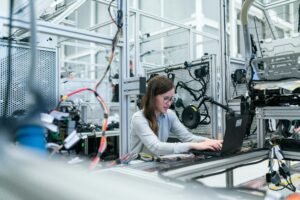
Technology
Artificial Intelligence (AI) is no longer just a buzzword—it’s becoming an integral part of our daily lives, reshaping industries, and influencing the way we work, learn, and live. But what does the future have in store for AI? While we can’t predict everything, experts are making some bold predictions about the technology’s potential. Here are seven shocking AI predictions that could change everything we know about the world.
1. AI Will Surpass Human Creativity in the Arts
One of the most shocking predictions is that AI will eventually surpass human creativity in fields like art, music, and literature. While this may sound far-fetched, advancements in AI-generated art and writing suggest that machines can replicate—and in some cases, improve upon—human creativity. AI platforms like OpenAI’s GPT-3 and DeepMind have already demonstrated the ability to generate essays, poems, and even paintings with an impressively high degree of originality.
Why This Matters: Imagine a future where AI not only aids artists but also competes with them, creating entirely new forms of expression. The creative industries could be forever changed, and artists may find themselves collaborating with AI to produce art in ways we’ve never seen before.
2. AI Will Drive a New Era of Personalized Medicine
Personalized medicine is already making strides, but AI is set to accelerate this revolution. Machine learning algorithms are being used to analyze vast amounts of medical data—from genetic information to lifestyle choices—allowing for hyper-targeted treatments and medications. In the future, AI may be able to predict and even prevent diseases before they develop by analyzing genetic predispositions and environmental factors.
Why This Matters: Imagine an AI-driven health assistant that can predict health risks based on your individual genetics and suggest personalized treatment plans. We could see the elimination of one-size-fits-all healthcare and a move toward more effective, precise, and timely medical interventions.
3. AI Will Be Fully Integrated into Everyday Life—No Human Input Required
As AI becomes increasingly autonomous, it will move beyond serving as a tool to an active partner in our daily lives. AI assistants will likely evolve into highly sophisticated systems capable of managing entire households, personal finances, and even making decisions about what we eat, where we travel, and how we live—without us needing to lift a finger.
Why This Matters: AI could eliminate much of the decision-making burden we face, freeing us up to focus on more complex and fulfilling tasks. However, this also raises important questions about privacy, autonomy, and dependency on technology.
4. AI Will Create New Jobs, But Many Traditional Roles Will Vanish
One common fear about AI is that it will replace jobs, leading to widespread unemployment. While it’s true that some roles, particularly in manufacturing and administrative work, may become obsolete, AI is also expected to create new types of jobs—many of which we can’t even imagine yet. As AI evolves, there will be a greater demand for data scientists, AI ethicists, and human-AI collaboration specialists.
Why This Matters: The workforce will need to adapt by acquiring new skills, focusing on fields like AI programming, machine learning, and robotics. While some jobs will disappear, the rise of AI will also usher in a new wave of opportunities.
5. AI Will Revolutionize Education, Making Learning More Accessible
AI is set to transform the education sector, removing obstacles and providing tailored learning experiences.Imagine a future where AI tutors adapt to each student’s learning pace, style, and strengths. AI-powered platforms could offer affordable, tailored education to students in remote or underserved regions, making learning more accessible to all.
Why This Matters: AI could level the playing field for students globally, democratizing education and allowing anyone, anywhere, to access high-quality learning resources. It could help bridge gaps in the education system and provide a more personalized, effective way of learning.
6. AI Will Enable the Creation of Sentient Machines
Perhaps the most mind-blowing prediction is that AI will eventually become sentient, gaining self-awareness and the ability to think independently. While we’re still far from achieving true AI sentience, some researchers believe that as AI systems become more complex, they may develop a sense of consciousness. This could fundamentally alter our relationship with machines.
Why This Matters: Sentient AI could challenge the very definitions of consciousness, intelligence, and what it means to be human. Ethical dilemmas surrounding AI rights, autonomy, and its role in society would emerge, forcing us to confront the complexities of human-AI interaction.
7. AI Will Contribute to Solving Global Problems Like Climate Change
AI’s potential to tackle large-scale global issues like climate change is staggering. Machine learning algorithms are already being used to predict weather patterns, optimize energy usage, and identify efficient renewable energy sources. In the future, AI could help model solutions to environmental crises, such as climate change, by simulating complex global systems and identifying sustainable alternatives.
Why This Matters: With the world facing environmental challenges, AI could be a crucial tool in our efforts to combat climate change, reduce carbon emissions, and create more sustainable systems. AI-driven innovations could help us better understand and mitigate the impact of human activity on the planet.
Conclusion
As AI continues to advance, its influence on our world will only intensify. While some of these predictions might sound shocking, the pace of technological development suggests that the future of AI could be even more transformative than we can imagine. From revolutionizing the creative industries to solving global problems, AI is poised to change everything—one innovation at a time. The question isn’t whether AI will change our lives; it’s how quickly and in what ways. Prepare for a future where AI doesn’t just support us, but actively reshapes the world we live in.




